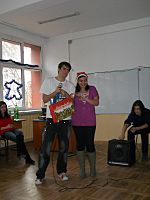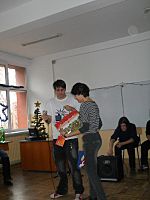Christmas in Romania facts for kids
Quick facts for kids Christmas in Romania |
|
|---|---|
| Official name | Crăciunul în România |
| Observed by | Romania |
| Significance | in memory of the birth of Jesus |
| Celebrations | Christmas tree decorations, church services |
| Date | 25 December |
| Next time | 25 December 2026 |
| Frequency | annual |
| Related to | Advent |
Christmas in Romania (Romanian: Crăciunul în România) is a very important yearly celebration. It takes place on December 24th and 25th, just like in many other Christian countries. People in Romania started celebrating Christmas when Christianity first came to the country. However, during the Communist years (from 1948 to 1989), public celebrations were not encouraged. After the Communist period ended in 1989, Christmas began to be celebrated much more joyfully again.
The Christmas holiday season in Romania officially begins on November 30th, which is Saint Andrew's Day. It ends on January 7th, with the celebration of Saint John. Other big holidays during this time include Great Union Day, Saint Nicholas' Day, Saint Ignatius' Day, Christmas Eve (called Ajunul Craciunului), Christmas Day (Craciun), Saint Stephen's Day, New Year's Eve (Revelion), and the Epiphany.
Preparing for Christmas: Advent
The seven-week Advent season is a special time before Jesus Christ's birth. It is important for all Eastern Christian Romanians. This period starts every year on November 14th and finishes on Christmas Day. November 14th is traditionally called Lăsata secului, which means "the day abstinence begins." During Advent, people usually avoid eating animal products. On Wednesdays and Fridays, they also avoid oil. However, on some special days, like Saint Ignatius Day or Great Union Day, Christians are allowed to eat fish or dairy. Christmas Eve is a day of total abstinence to thank God for sending The Savior. In total, there are forty days of Advent, with a few exceptions. This is the second longest period of abstinence in the Romanian religious year, after the Easter Advent.
The Christmas season in Romania officially starts with Saint Andrew's feast day on November 30th. Old customs say that everyone should hang lots of garlic and a crucifix near all doors and windows. This is believed to keep away bad spirits and spells from their homes. Some people believe that Strigoi or vampires might appear during the night between November 29th and November 30th. This night is known as Noaptea lupului (Night of the wolf).
The very next day, December 1st, is Great Union Day (Ziua Marii Uniri). This is the National Day of Romania and is celebrated by all Romanians. In cities like Bucharest and Alba Iulia, the Romanian Armed Forces hold parades. They show off their vehicles and play the Romanian national anthem, "Deșteaptă-te, române!" People often get free food like mititei and fasole cu cârnați while they enjoy parties. Free music concerts and street festivals are held every year in many Romanian cities. There are also special TV shows, especially on Pro TV, which feature famous Romanians. The day usually ends with fireworks.
At the beginning of December, the Christmas lights are turned on all over the streets. On the same night, Moş Nicolae (like Santa Claus) comes and brings presents to children. Children receive their gifts early in the morning of December 6th or late at night on December 5th. Traditionally, the gifts are placed in their laced-up boots. Children usually get sweets or books. If they have been naughty, they might find wooden sticks instead!
On December 20th, which is Saint Ignatius Day, Romanians start the final preparations for Christmas. On this day, they often prepare pigs for the Christmas Eve supper. Around this time, people also buy their Christmas trees from public markets or supermarkets.
On December 24th, it is Noaptea de ajun (Christmas Eve). This is the day when children usually start caroling their neighbors. On this same day, women bake traditional cookies to give to the children who come caroling. By this time, the Christmas tree must usually be already decorated and ready.
Christmas Music and Caroling
Music is a very important part of Christmas celebrations all over Romania. There is a special type of music called colindă. These are like Christmas carols but often have more traditional or Christian lyrics. The words of all colinde are about the birth of Jesus. However, some parts of these folk rituals might be older than Christianity. They could come from ancient Roman festivals like Saturnalia or other traditions related to the winter solstice and good harvests. Colinde are sung in all parts of Romania (including Moldova), with small differences depending on the region.
In traditional Romanian villages, people would start getting ready for colinde weeks before Christmas. Young people, usually boys, would form groups in different places. They would choose a leader to help them practice singing together. These groups are called cete de colindători, and their size can vary.
Then, starting on Christmas Eve, these groups would go to different houses and begin to sing. In some villages, they visit the mayor's house first, then the teacher's house. In other places, there is no special order. Families would invite the carolers inside and give them small gifts. These gifts might include nuts, dried fruits, or pretzels. There are also Romanian versions of international carols, like "Noapte de vis" (from "Silent Night") or "O, brad frumos!" (from "O Tannenbaum").
Some examples of colinde with religious themes are "Astăzi s-a născut Hristos" (Today Christ Was Born) and "O, ce veste minunată!" (Oh, What Wonderful News!). These songs talk about the Nativity of Jesus. "Trei păstori" (Three Shepherds) and "Trei crai de la rărărit" (Three Magi from the East) tell stories about the shepherds and the Three Wise Men. "Steaua" (The Star) is about the Christmas star. "Sus la poarta Raiului" (Up at Heaven's Gate) describes the Manger where Jesus was born.
Besides religious songs, there are many other original colinde about joy, Prosperity, or caroling itself. For example, "Moş Crăciun cu plete dalbe" (White-Haired Santa Claus) is about Santa Claus bringing presents to good children on Christmas day. "Pluguşorul" is about a special Romanian custom to bring health and good fortune.
Many famous Romanian musicians have sung or updated these traditional songs. Artists like Maria Tănase and the Madrigal choir have performed many carols. Ştefan Hruşcă is another well-known Christmas singer who goes on tours every year. Rock & Roll singer Ştefan Bănică, Jr. has also held popular Christmas concerts in Bucharest since 2002. Other singers like Paula Seling, Andra, and Elena Gheorghe have also released popular Christmas albums.
In 2009, Ştefan Bănică, Jr. also starred in a Christmas movie called "Ho, Ho, Ho!". The movie's soundtrack included Christmas songs. Also in 2009, house music artist Inna released a Christmas song called "I Need You for Christmas". This song became popular even outside Romania, reaching charts in Russia and the UK Singles Chart.
Radio station Magic FM plays only Christmas songs from December 5th to January 5th each year. They even call themselves "Santa Claus' Radio Station."
Christmas Food
During Christmas, Romanians prepare many special dishes, including delicious desserts and sweets. A very common Christmas treat is Cozonac (spongecake). This is a type of sweet bread, similar to Panetone. It is made with flour, egg yolks, yeast, and many other ingredients and flavors. There are many different types of Cozonac, and hundreds of recipes! You can fill it with walnuts, cocoa, raisins, or even Turkish delight. In Transylvania, people often use poppy seed paste. Plates piled high with small pastries and cakes are prepared to offer to the carolers when they visit.
Another popular Christmas dish is a molded vegetable and chicken salad called Salată de boeuf. It is held together with mayonnaise and decorated with olives and boiled eggs. Even though its name sounds French and means "beef salad," it usually does not contain beef.
Other traditional Christmas dishes include piftie (a meat jelly), sarmale (cabbage rolls), and various pork dishes.
See also
- Christmas worldwide
- Public holidays in Romania
 | Anna J. Cooper |
 | Mary McLeod Bethune |
 | Lillie Mae Bradford |



